In an era where the gaming landscape continually pushes the boundaries of creativity, the upcoming title “Penguin Colony” boldly defies conventions. It dares to combine elements as disparate as Antarctic wildlife and cosmic horror, crafting a narrative where penguins are no longer mere flightless birds but vital players in a fractious, Lovecraftian universe. Unlike typical wildlife simulators, this game employs a layered storytelling approach, hinting at a deeper critique of colonialist and racial narratives embedded within Lovecraft’s mythos. The developers, renowned for the politically charged “Umurangi Generation,” have a history of threading social commentary into their projects, making their latest venture a potentially groundbreaking addition to the indie game sphere.
What makes “Penguin Colony” particularly engaging is its audacity to entwine humor, horror, and philosophy through an unlikely lens. The game’s trailer, voiced by Lenval Brown—a narrator celebrated for his work on “Disco Elysium”—sets a tone that oscillates between the surreal and the unsettling. Visually, the trailer echoes the haunting atmosphere of John Carpenter’s “The Thing,” with a tension-filled, isolated Antarctic setting that amplifies the dread lurking beneath icy surfaces. This stylistic choice signals to players that beneath the playful penguin veneer lies a capable rendering of existential terror, inviting audiences to reconsider their perceptions of innocence and darkness in the cold.
The Intriguing Political and Cultural Undertones
Given the creators’ track record, it’s unsurprising that “Penguin Colony” subtly incorporates themes of decolonization and cultural critique. The presence of Māori-language narration in the trailer suggests an intention to confront cultural imperialism, perhaps a doff of the hat to the often problematic portrayals of the “exotic” in Lovecraft’s stories. This nuanced inclusion offers hope that the game might challenge traditional colonial narratives by framing non-Western perspectives within its cosmic mythos. It’s an audacious gambit—melding a playful Antarctic adventure with a critique of racial stereotypes and colonialist history—in a way that forces players to examine not just the game’s world but also the broader cultural context it inhabits.
Moreover, the game’s mechanics—accessed via unlocking different penguins—underscore themes of adaptability and unique perspectives. Each penguin’s abilities mirror broader societal metaphors, encouraging players to contemplate how diverse identities navigate challenging environments. Whether playing as a tiny, agile chick or a robust adult penguin, the game promises a layered experience that transcends mere survival, delving into questions of agency, perception, and resilience.
Humor, Cosmic Dread, and the Power of Paradox
Despite its lofty themes, “Penguin Colony” embraces absurdity and humor. The game’s predecessor, “Faaast Penguin,”—a frantic multiplayer race—serves as a nod to the playful, chaotic spirit underpinning this universe. The invocation of cosmic “penguin diagrams,” a humorous mash-up of quantum physics and bird anatomy, exemplifies the game’s delight in surreal juxtapositions that both entertain and provoke thought. Such absurdities evoke the idea that perhaps our universe itself is a cosmic Penguin game—an endlessly complex, mysterious, and hilarious farce.
The prospect of controlling diverse penguins with distinct capabilities positions the game as not just an escapade into fantasy, but a metaphor for navigating the complexities of identity, environment, and cosmic indifference. Playing as a baby penguin, with its physical limitations, reminds us that even in the face of cosmic horrors, vulnerability can be a form of resilience. Conversely, the notion of slipping and sliding across icy terrain against a Lovecraftian backdrop underscores the fragility of sanity amid incomprehensible terrors.
Ultimately, “Penguin Colony” is poised to challenge players to confront their own perceptions of innocence, fear, and cosmic insignificance—all wrapped in a quirky, visually striking package. It invites us to experience a universe where the line between hilarity and horror blurs, forcing us to ask: how do we find meaning when everything we know is threatened by the unfathomable? Perhaps, in embracing the absurd and the terrifying simultaneously, we can better understand our place amid the cosmic penguin chaos.

